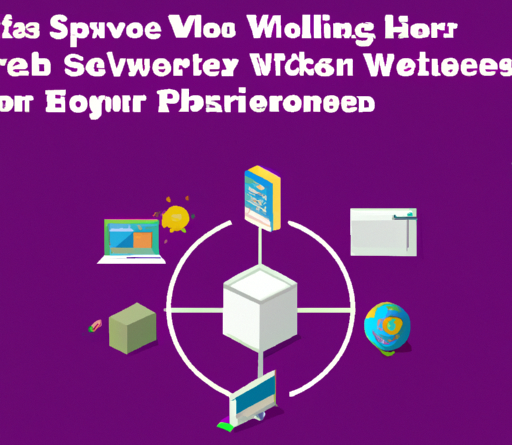In this article, you will learn about what a VPN server is and how it helps to secure network communication. A VPN server, or virtual private network server, is a server that allows you to create a secure connection over a public network, such as the internet. It acts as an intermediary between your device and the websites or services you are trying to access. This ensures that your data is encrypted and protected from potential threats or hackers, making it a valuable tool for maintaining your online privacy and security.
What is a VPN server?
A VPN server, also known as a Virtual Private Network server, is a secure network connection that allows you to create a private, encrypted tunnel between your device and the internet. It acts as an intermediary between your device and the websites or services you access, encrypting your data and masking your IP address to provide you with privacy and security.
Definition of a VPN server
In simple terms, a VPN server is a specialized computer that acts as a gateway for your internet connection. When you connect to a VPN server, all your internet traffic is routed through this server before reaching its destination. This means that all your data is encrypted and protected from potential eavesdroppers and hackers.
How a VPN server works
When you connect to a VPN server, it creates a secure, encrypted connection between your device and the server itself. This is done using protocols such as OpenVPN, IPsec, or L2TP. Once the connection is established, all your internet traffic is encrypted and sent through the VPN server.
The VPN server then decrypts the data and forwards it to its intended destination, whether it’s a website, an online service, or a remote server. This process ensures that your data remains secure and private, even when you’re using public Wi-Fi networks or accessing the internet from a different country.
Importance of a VPN server
A VPN server is essential for securing your network communication due to several reasons. Firstly, it encrypts your data, making it unreadable to anyone who might intercept it. This is particularly important when you’re using public Wi-Fi networks, as these are often targeted by hackers looking to steal personal information.
Additionally, a VPN server masks your IP address, replacing it with the IP address of the server. This provides an extra layer of privacy and anonymity, as websites and online services can only see the IP address of the VPN server, not your real IP address. This helps prevent online tracking and profiling.
Finally, a VPN server allows you to bypass geo-restrictions and access content that might otherwise be unavailable in your location. By connecting to a server in a different country, you can appear as if you’re browsing from that country, giving you access to region-locked websites and services.
Types of VPN servers
There are several types of VPN servers, each serving a different purpose. Understanding these types can help you choose the right VPN server for your needs.
Remote Access VPN server
A remote access VPN server, also known as a client-server VPN, enables individuals or employees to establish secure connections to a private network from remote locations. This is particularly useful for remote workers or individuals who need to access company resources from outside the office.
When you connect to a remote access VPN server, your device becomes part of the private network, just as if it were physically connected to the network. This allows you to access files, applications, and other resources that are only available within the private network.
Site-to-Site VPN server
A site-to-site VPN server, also known as a router-to-router VPN, connects multiple networks together to create a secure, private network. This type of VPN server is commonly used by businesses that have multiple locations or branch offices.
When two or more networks are connected using a site-to-site VPN server, they can communicate securely and privately, as if they were on the same physical network. This allows businesses to share resources, collaborate on projects, and maintain consistent network security across multiple locations.
Mobile VPN server
A mobile VPN server is specifically designed for mobile devices, such as smartphones and tablets. It provides a secure and private connection for users who are on the go, allowing them to access the internet and browse securely, even when connected to public Wi-Fi networks.
Mobile VPN servers are particularly important for protecting sensitive information, such as online banking transactions or personal emails, which are often accessed on mobile devices. By encrypting the data and routing it through a VPN server, mobile users can ensure that their information remains private and secure.
Features of a VPN server
VPN servers offer a range of features that enhance security, privacy, and accessibility. Here are some key features to consider:
Data encryption
One of the most essential features of a VPN server is data encryption. Encryption ensures that your data is secure and unreadable to anyone who might intercept it. The VPN server encrypts your data using advanced encryption algorithms, making it virtually impossible for hackers or eavesdroppers to decipher.
Anonymity and privacy
A VPN server provides anonymity and privacy by masking your IP address. By replacing your real IP address with the IP address of the server, the VPN server prevents websites and online services from tracking your online activities. This helps protect your privacy and prevents online profiling.
Access to geo-restricted content
Another important feature of a VPN server is the ability to bypass geo-restrictions and access content that might be blocked in your location. By connecting to a server in a different country, you can appear as if you’re browsing from that country, giving you access to region-locked content such as streaming services or websites.
Setting up a VPN server
Setting up a VPN server requires a few steps, but it can be done even by individuals with basic technical knowledge. Here’s a brief overview of the process:
Choosing a suitable server operating system
To set up a VPN server, you’ll need a server operating system that supports VPN functionality. Popular choices include Windows Server, Linux, and macOS Server. Consider factors such as ease of use, compatibility with your existing infrastructure, and security features when choosing an operating system.
Selecting the appropriate VPN software
Once you have chosen your server operating system, you’ll need to install VPN software that supports the chosen operating system. There are numerous VPN software options available, both free and paid. Consider factors such as ease of use, security features, and customer support when selecting VPN software.
Configuring the server settings
After installing the VPN software, you’ll need to configure the server settings. This involves specifying the encryption protocols, setting up user accounts, and configuring any network-specific settings. Most VPN software comes with comprehensive documentation or user guides that can guide you through the configuration process.
Benefits of using a VPN server
Using a VPN server provides several benefits that enhance your online experience. Here are some key advantages:
Enhanced security and privacy
Perhaps the most significant benefit of using a VPN server is the enhanced security and privacy it provides. By encrypting your data and masking your IP address, a VPN server ensures that your online activities remain private and secure, even when using public Wi-Fi networks or accessing the internet from different locations.
Bypassing censorship and restrictions
A VPN server allows you to bypass censorship and access content that might be blocked in your location. By connecting to a server in a different country, you can overcome regional restrictions and access websites, services, or content that might otherwise be unavailable to you.
Secure remote access
For businesses, a VPN server offers secure remote access to company resources. This is particularly useful for remote workers or individuals who frequently travel for work. By establishing a secure connection to the company’s private network, employees can access files, applications, and other resources as if they were physically present in the office.
VPN server vs Proxy server
While both VPN servers and proxy servers offer privacy and security benefits, there are significant differences between the two. Here’s a comparison:
Differences between VPN server and Proxy server
- Encryption: VPN servers encrypt all your internet traffic, while proxy servers do not provide encryption. This means that a VPN server offers a higher level of security and privacy.
- IP Address Masking: VPN servers replace your real IP address with the IP address of the server, while proxy servers only relay your internet traffic. This makes it more difficult to track or trace your online activities when using a VPN server.
- Application Support: VPN servers can be set up to route all your internet traffic through the server, including all applications and services on your device. Proxy servers, on the other hand, may only support specific applications or services.
Advantages of using a VPN server over a Proxy server
- Stronger Encryption: VPN servers use strong encryption algorithms to protect your data, making it virtually impossible for hackers or eavesdroppers to decipher. Proxy servers do not offer encryption, leaving your data vulnerable to interception.
- Complete Anonymity: VPN servers mask your IP address, making it difficult for websites and online services to track your online activities. Proxy servers do not provide the same level of anonymity, as your real IP address is still visible to websites and services.
- Support for All Applications: VPN servers can route all your internet traffic, ensuring that all applications and services on your device benefit from the security and privacy provided by the VPN server. Proxy servers may only support specific applications or services, leaving others unprotected.
Common challenges of VPN servers
While VPN servers offer numerous benefits, there are also some common challenges to be aware of:
Slower internet speed
Using a VPN server may result in slower internet speeds compared to a direct connection. This is because your data has to be encrypted and transmitted through the VPN server before reaching its destination. However, advancements in VPN technology and faster internet connections have significantly reduced this issue.
Compatibility issues
Some devices or networks may have compatibility issues with certain VPN software or protocols. It’s important to choose VPN software that is compatible with your device or network to avoid any compatibility issues. Additionally, some networks, such as certain corporate networks, may block or restrict the use of VPN servers.
Risk of VPN server logs
While many VPN providers claim to have a strict no-logs policy, there is still a risk that VPN servers may log some information about your online activities. It’s important to choose a reputable VPN provider that has a transparent logging policy to minimize this risk. Additionally, using VPN servers located in countries with strict data privacy laws can further enhance your privacy.
Considerations for choosing a VPN server
When choosing a VPN server, there are several factors to consider to ensure you select the right one for your needs. Here are some key considerations:
Server location
The location of the VPN server can impact your connection speed and access to geo-restricted content. If you primarily want to bypass geo-restrictions, choose a VPN server located in the country where the desired content is accessible. Additionally, consider the proximity of the VPN server to your physical location, as this can affect connection speeds.
Connection protocols
VPN servers support different connection protocols, such as OpenVPN, IPsec, or L2TP. Consider the security, speed, and compatibility aspects of each protocol when choosing a VPN server. OpenVPN is generally considered the most secure and flexible protocol, while IPsec is commonly used for site-to-site VPN connections.
Provider reputation
Choosing a reputable VPN provider is essential to ensure the security and privacy of your data. Research the provider’s track record, user reviews, and certifications to assess their reputation. Additionally, check if the VPN provider has undergone any third-party security audits to further validate their commitment to security and privacy.
VPN server security best practices
To maximize the security and privacy of your VPN server, consider implementing the following best practices:
Regular updates and patches
Ensure that your VPN server software is always up to date with the latest security patches. Regularly check for updates and apply them promptly to protect against any known vulnerabilities. Many VPN software providers offer automatic updates, making this process straightforward.
Strong authentication methods
Implement strong authentication methods for accessing your VPN server, such as two-factor authentication. This adds an extra layer of security by requiring users to provide a second form of identification, such as a code generated by a mobile app or a physical security key, in addition to their username and password.
Monitoring and logging
Monitor your VPN server for any suspicious activity or potential security breaches. Enable logging and regularly review the logs to identify any unauthorized access attempts or abnormal behavior. This can help you detect and mitigate security incidents in a timely manner.
Conclusion
In conclusion, a VPN server is a crucial tool for securing network communication. By encrypting data, masking IP addresses, and providing access to geo-restricted content, a VPN server enhances privacy, security, and accessibility. Whether you’re an individual looking to protect your online activities or a business in need of secure remote access to company resources, a VPN server offers significant benefits.
Advancements in VPN server technology have made it easier than ever to set up and use a VPN server, even for individuals with limited technical knowledge. The future of VPN servers looks promising, with continued developments in encryption algorithms, improved performance, and enhanced user experience.
So, if you value your privacy and want to ensure secure network communication, consider setting up a VPN server and enjoy the peace of mind that comes with knowing your data is protected.






